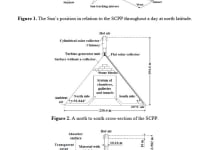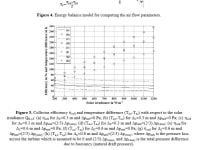
A new model for a solar chimney power plant (SCPP) with a square-based pyramidal shape, having three sloped solar collectors (each having the shape of a trapezium), a cylindrical collector, a chimney and a field of sun-tracking mirrors, has been abstracted. The geographical latitude and the dimensions of the truncated pyramidal base structure correspond to the ones of the Great Pyramid of Giza. The east, south and west sides of the pyramid are assumed to be constructed as flat solar collectors, while the upper part of the chimney has a cylindrical collector. On the north side, the truncated pyramid has one inlet implying there is no collector on this north side. The ambient air enters the pyramid from the north side and drops to the ground surface as cooled by the pyramid’s interior where three side-outlets are left (on the east, south and west sides). There is a large mass of stone inside the pyramid implying the interior air temperature is constant and equals 20 degC. The inclination angle of the sides of the pyramid equals 51.844 deg and approximates the sum of the angle of local latitude (29.981 deg) and the angle of the Earth's axial inclination (23.44 deg) on the summer solstice. By choosing this angle of the sides of the pyramid vs. its latitude, the pyramid casts no shadow between the spring and fall equinoxes. According to the model, a material layer having a high heat capacity is placed below each of the absorber surfaces, while the lower surfaces of these materials are adiabatic. The upper part of the chimney is designed as a hollow cylindrical reservoir having an inner surface temperature 565 degC. The SCPP uses a large field of rotating mirrors to track the Sun and focus the reflected sunlight onto a heat-receiving upper part of the chimney. The fluid in the reservoir collects the heat and uses it to warm up the air inside the chimney. The chimney, three sloped collectors and one cylindrical collector induce day air draft. Internal and external heat capacities/storages can also induce night air draft. The night air draft is mainly created by the cylindrical collector using heat stored during day time.
Additional information related to the developed mathematical model can be found at the following site: http://www.infoteh.rs.ba/rad/2014/ENS-4/ENS-4-11.pdf
The Sun’s position in relation to a SCPP throughout a day at north latitude is shown in Figure 1.
A north to south cross-section of the proposed SCPP design is shown in Figure 2.
A west to east cross-section of the proposed SCPP design is shown in Figure 3.
An energy balance model for computing the air flow parameters is shown in Figure 4.
Collector efficiency and temperature difference with respect to the solar irradiance are shown in Figure 5.
Air velocities with respect to the solar irradiance are shown in Figure 6.
Electric power and pressure drop with regard to the solar irradiance are shown in Figure 7.
-
Awards
-
 2014 Top 10 Most Popular
2014 Top 10 Most Popular
Like this entry?
-
About the Entrant
- Name:Dardan Klimenta
- Type of entry:teamTeam members:Joan Peuteman
Jelena Klimenta - Software used for this entry:MATLAB
- Patent status:none








